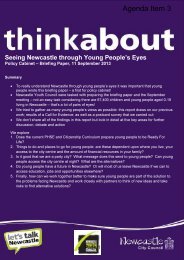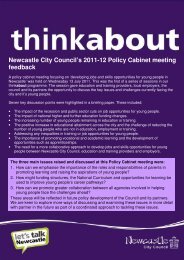NEWCASTLE'S MUSICAL HERITAGE AN INTRODUCTION By ...
NEWCASTLE'S MUSICAL HERITAGE AN INTRODUCTION By ...
NEWCASTLE'S MUSICAL HERITAGE AN INTRODUCTION By ...
You also want an ePaper? Increase the reach of your titles
YUMPU automatically turns print PDFs into web optimized ePapers that Google loves.
that continued until 1914. One of the first orchestras to come to Newcastle was<br />
from Manchester, the Charles Halle Band, which had been founded in 1856/57<br />
by Halle from Germany, who was knighted in 1888 for his services to music.<br />
Through the good offices of Alderson and Brentnall, subscription concerts were<br />
arranged throughout 1876-1889 and regular series’ of concerts were given by the<br />
orchestra. In 1886 Hans Richter and an orchestra of eighty-five musicians visited<br />
Newcastle for the first time and in 1888, Augustus Manns, of Crystal Palace<br />
fame, with his orchestra played in Newcastle, as they were to do for many<br />
seasons after that. Richter had a ‘bee in his bonnet’ about Manns, who, he was<br />
convinced, was trying to do him down as they followed each other around the<br />
country on tour. In 1904/5 Henry Wood and the Queen’s Hall Orchestra played<br />
in town for the first time and the following season had the London Symphony<br />
Orchestra conducted by Edward Elgar playing three of his own compositions. He<br />
returned again in 1916 with the LSO and after the war on 8 th May 1920 as<br />
conductor of the Leeds Choral Union in a performance of his oratorio ‘The<br />
Apostles’ in St Nicholas’ Cathedral. On this occasion, which was a time of<br />
bereavement for the composer following the death of his beloved wife, Alice, he<br />
noted in his diary ‘Our wedding day 1889’<br />
Much earlier on 24 th November 1900 Richter returned to Newcastle with the<br />
Halle Orchestra and gave the first performance in the town of Beethoven’s Ninth<br />
Symphony. That same year he gave Newcastle their first performances of<br />
Dvorak’s New World Symphony and Edward Elgar's Enigma Variations. Hans<br />
Richter, who had known Wagner well and conducted the premier of his Ring<br />
Cycle, was very pro-English – although his spoken English was reportedly poor -<br />
and he did a good deal for English orchestras and orchestral music in the<br />
provinces in those early days. On 20 th March 1901 Richter and the Halle<br />
Orchestra joined forces with the Newcastle and Gateshead Choral Union in a<br />
concert performance of ‘Faust’ by Hector Berlioz that took place at the Olympia<br />
on Northumberland Road. The Musical Times reported afterwards that concerts<br />
recently given in Newcastle by the Choral Union and the Halle Orchestra<br />
surpassed anything previously heard in that town at that time. In the 1903/4<br />
Season the Choral Union invited Dr Richter and the Halle Orchestra to Newcastle<br />
and took the unusual step of a vote amongst its members as to what items<br />
should make up the programme; based on a list of a number of specified works<br />
suggested by Dr Richter. Of the symphonies the Eroica of Beethoven topped the<br />
list with 137 votes, Tchaikovsky’s Fifth Symphony came second with only 81<br />
votes and Brahms Second Symphony, third with 47 votes. Wagner came out on<br />
top in the overtures and only Cherubini got no votes. In the other sections<br />
Wagner romped home with 240 votes for his ‘Walkurenrittand’ and Richard<br />
Strauss was second with his ‘Tod und Verklarung’. The whole exercise proved to<br />
some extent that Newcastle audiences did not just want to hear the old and<br />
familiar and were not afraid to try the new. In the press review following the<br />
concert the audience was complimented on its advanced taste, although, the<br />
review went on to say:<br />
73

















